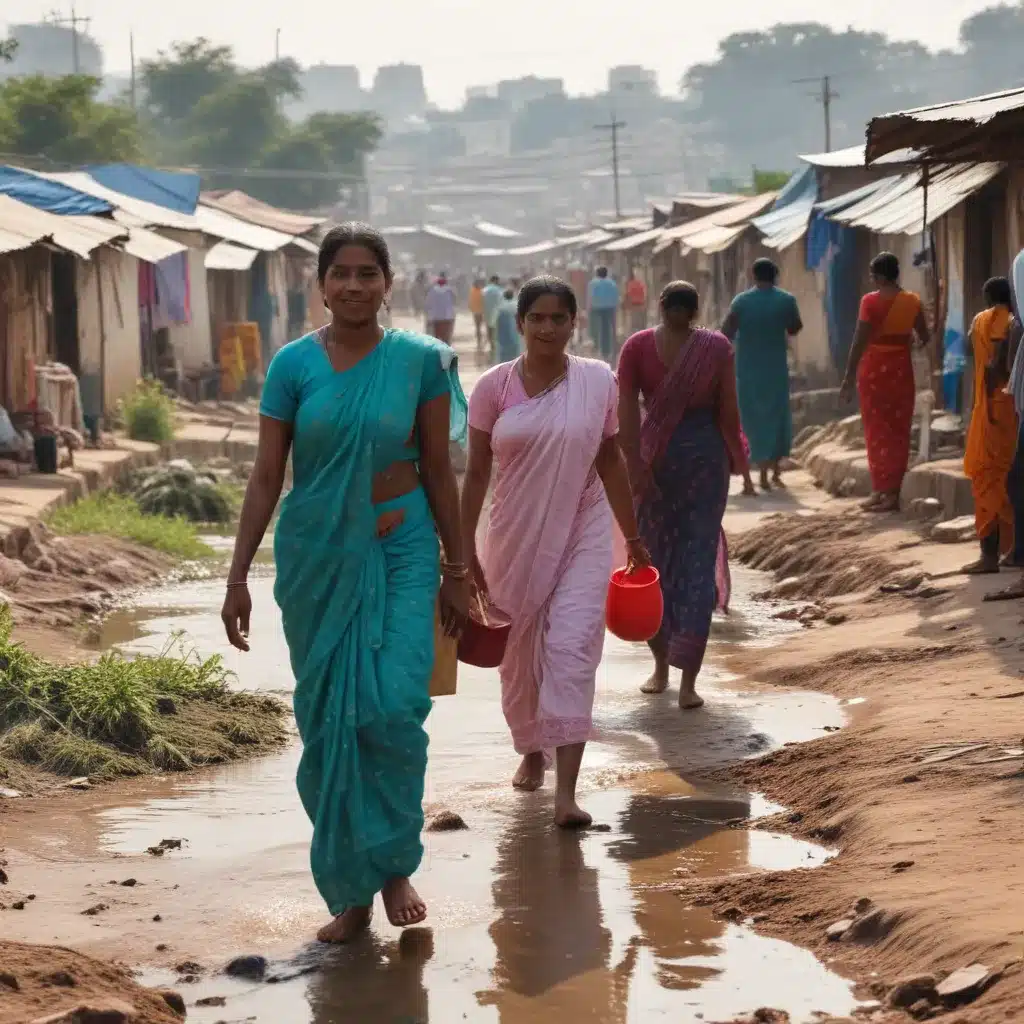
Navigating the Complexities of Water, Sanitation, and Hygiene for Transient Communities
In the bustling city of Hyderabad, India, a significant portion of the population resides in informal settlements, often referred to as slums. These settlements, home to thousands of migrant workers and their families, face unique challenges in accessing basic water, sanitation, and hygiene (WASH) services. Addressing the distinct needs of these transient communities is crucial in ensuring their right to a dignified and healthy living environment.
Understanding the Migrant Experience in Hyderabad’s Informal Settlements
Hyderabad’s informal settlements are characterized by a high influx of migrant workers, many of whom have fled their rural homes in search of better economic opportunities. These migrants, often from nearby states or even neighboring countries, come to the city with the hope of securing employment in construction, manufacturing, or the service industry. However, upon arrival, they are confronted with a stark reality – the lack of affordable housing and basic WASH infrastructure.
“When we first arrived in Hyderabad, we had no choice but to settle in this slum area,” shares Ravi, a migrant worker from the state of Andhra Pradesh. “The rent is low, but the living conditions are far from ideal. We struggle to find clean water, and the communal toilets are often overcrowded and unsanitary.”
The precarious nature of the migrants’ living arrangements is further exacerbated by their transient status. Many are hesitant to invest in improving their living conditions or engaging with local authorities, fearing potential displacement or harassment. This reluctance to participate in community initiatives, coupled with the lack of formal land tenure, presents significant challenges in addressing the WASH needs of these populations.
Confronting the Unique WASH Challenges
Migrant communities in Hyderabad’s informal settlements face a multitude of WASH-related challenges that are often overlooked or underestimated by policymakers and service providers.
Access to Clean Water: The availability and quality of water sources are major concerns for these communities. Many rely on public taps or hand pumps that are shared among hundreds of households, leading to long queues and intermittent supply. Additionally, the water quality is often compromised, exposing residents to the risk of waterborne diseases.
Sanitation and Hygiene: The lack of adequate and well-maintained toilet facilities is a pressing issue. Communal toilets are often overcrowded, poorly maintained, and inaccessible, particularly for women and children. Open defecation remains a common practice, further contributing to the spread of infectious diseases.
Waste Management: Informal settlements typically lack efficient waste collection and disposal systems. Uncollected garbage and improper waste management lead to the accumulation of refuse, creating breeding grounds for pests and contributing to environmental degradation.
Limited Access to Health Services: Migrant populations often face barriers in accessing healthcare facilities, including language obstacles, lack of documentation, and financial constraints. This compounds the health risks associated with poor WASH conditions, leading to increased vulnerability to waterborne illnesses and other health complications.
Empowering Migrant Communities through Inclusive WASH Interventions
Addressing the unique WASH needs of Hyderabad’s migrant populations requires a multifaceted approach that prioritizes inclusivity, community engagement, and cross-sectoral collaboration.
Strengthening Partnerships and Advocacy: Nongovernmental organizations (NGOs) and community-based groups have a critical role to play in advocating for the rights of migrant communities and collaborating with local authorities to develop tailored WASH solutions. By fostering partnerships and amplifying the voices of these marginalized populations, they can influence policy decisions and secure access to essential services.
Implementing Community-Driven Initiatives: Engaging migrant communities as active participants in the design and implementation of WASH interventions is crucial for their long-term sustainability. Encouraging the formation of community-based organizations, supporting local leadership, and empowering residents to take ownership of project implementation can foster a sense of belonging and catalyze lasting change.
Enhancing Access to WASH Infrastructure: Investing in the development of decentralized, community-based WASH infrastructure, such as public water kiosks, community-managed sanitation facilities, and waste management systems, can significantly improve the living conditions of migrant populations. These solutions should be tailored to the unique needs and preferences of the communities, ensuring their accessibility and cultural acceptability.
Promoting Health Awareness and Hygiene Education: Comprehensive health and hygiene education campaigns, delivered in local languages and through trusted community channels, can equip migrant families with the knowledge and skills to practice good WASH habits. This, in turn, can lead to improved health outcomes and reduced incidence of waterborne diseases.
Strengthening Linkages with Essential Services: Fostering connections between migrant communities and essential service providers, such as healthcare facilities, social welfare programs, and livelihood initiatives, can enhance their overall well-being and resilience. Coordinating these efforts across different sectors can create a holistic support system for these vulnerable populations.
Towards a More Inclusive and Sustainable Future
Addressing the WASH needs of Hyderabad’s migrant populations is a complex and multifaceted challenge, requiring a collaborative and community-centric approach. By empowering these marginalized communities, strengthening partnerships, and investing in inclusive WASH solutions, we can work towards a future where all residents, regardless of their migration status, have access to the basic services and dignity they deserve.
Joint Action for Water is committed to supporting inclusive WASH initiatives that address the unique needs of migrant populations in Hyderabad’s informal settlements. Through research, advocacy, and on-the-ground interventions, we strive to ensure that every individual in the city has access to clean water, adequate sanitation, and the ability to maintain good hygiene practices.
Together, let us create a more equitable and sustainable Hyderabad, where the fundamental rights of all its residents, including the most vulnerable migrant communities, are recognized and upheld.

